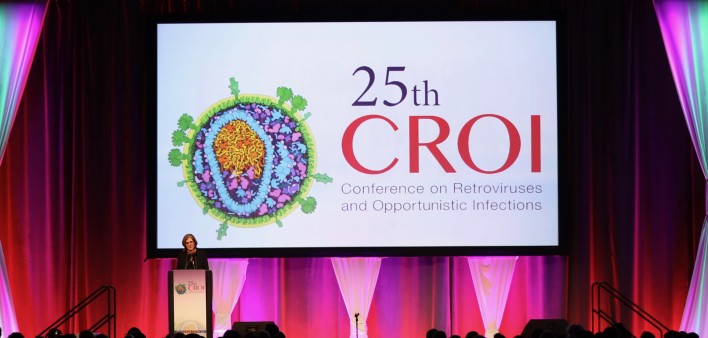People living with HIV may be diagnosed with cancer at a more advanced stage, suggesting that HIV may accelerate cancer progression, or they may be diagnosed earlier, possibly reflecting more consistent health monitoring as a result of being engaged in HIV care, according to research presented at the 25th Conference on Retroviruses and Opportunistic Infections (CROI 2018) last month in Boston.
Prior research has shown that people with HIV are more likely to develop several types of cancer, though for other types there appears to be no difference between HIV-positive and HIV-negative people. The increase in risk among people with HIV is especially notable for virus-linked cancers such as cervical and anal cancer (caused by human papillomavirus), liver cancer (caused by hepatitis B and C) and certain types of lymphoma (associated with Epstein-Barr virus).
Keri Calkins of Johns Hopkins University and colleagues compared outcomes among HIV-positive people with cancer enrolled in the Johns Hopkins HIV Clinical Cohort and the mostly HIV-negative general population represented in the National Cancer Institute’s Surveillance, Epidemiology and End Results (SEER) program.
Some studies suggest that people with HIV are diagnosed with cancer later, are less likely to receive treatment and have poorer survival than HIV-negative people, but data have been inconsistent. Greater immune suppression may result in more aggressive cancer and may make cancer treatment less tolerable, the researchers noted as background. In addition, people with HIV are more likely to have risk factors such as smoking and viral coinfections that affect cancer risk and outcomes.
Calkins and colleagues compared 254 HIV-positive people newly diagnosed with their first cancer (excluding Kaposi sarcoma) between 1997 and 2014 and nearly 1.9 million people diagnosed with first cancers of the same types in SEER between 2000 and 2014.
In the Johns Hopkins cohort, just over two thirds were men, 78 percent were Black and the median age at diagnosis was 50. The most common cancers were non-Hodgkin lymphoma (21 percent), lung cancer (17 percent), liver cancer (9 percent), Hodgkin lymphoma (7 percent), prostate cancer (7 percent), breast cancer (6 percent) and anal cancer (6 percent).
People in the Johns Hopkins cohort were substantially more likely than those in the SEER program to be diagnosed with localized cancer (30 percent versus 6 percent, respectively) after adjusting for age, sex, race, year of diagnosis and cancer type. Localized cancer generally indicates that it is at an early stage, although some cancers progress slowly and can still be localized years after they develop.
Likewise, the chances of having metastatic cancer that had spread to distant parts of the body were also greater in the HIV-positive group (45 percent versus 9 percent, respectively). Distant metastasis is typically an indication of late-stage cancer, though some cancers progress rapidly and can spread soon after they develop.
Overall, people in the Johns Hopkins cohort and those in SEER had a similar likelihood of receiving any kind of cancer treatment (83 percent versus 87 percent, respectively). This remained the case when looking at people with CD4 counts below 200 cells/mm3, indicating serious immune suppression.
HIV-positive people with cancer had overall shorter survival—by 5.4 months—than those in the general population within the first five years after a cancer diagnosis, when adjusting for demographic factors, year of diagnosis and cancer type. However, the difference was no longer statistically significant after accounting for cancer stage and treatment.
The difference in survival was more pronounced—a reduction of 11.7 months—among HIV-positive people with a low CD4 count. This difference was smaller (a reduction of 6.8 months) but remained significant after adjusting for cancer stage and treatment.
Notably, there was no significant difference in survival among HIV-positive people with CD4 counts above 200 cells/mm3, which is the case for most people taking modern antiretroviral therapy.
“People with HIV are more likely to be diagnosed with cancer at earlier and later stages than the general U.S. population, suggesting that HIV may contribute to faster progression and that engagement in HIV care may improve earlier detection,” the researchers concluded.
Click here to see the CROI 2018 abstract and poster.







1 Comment
1 Comment